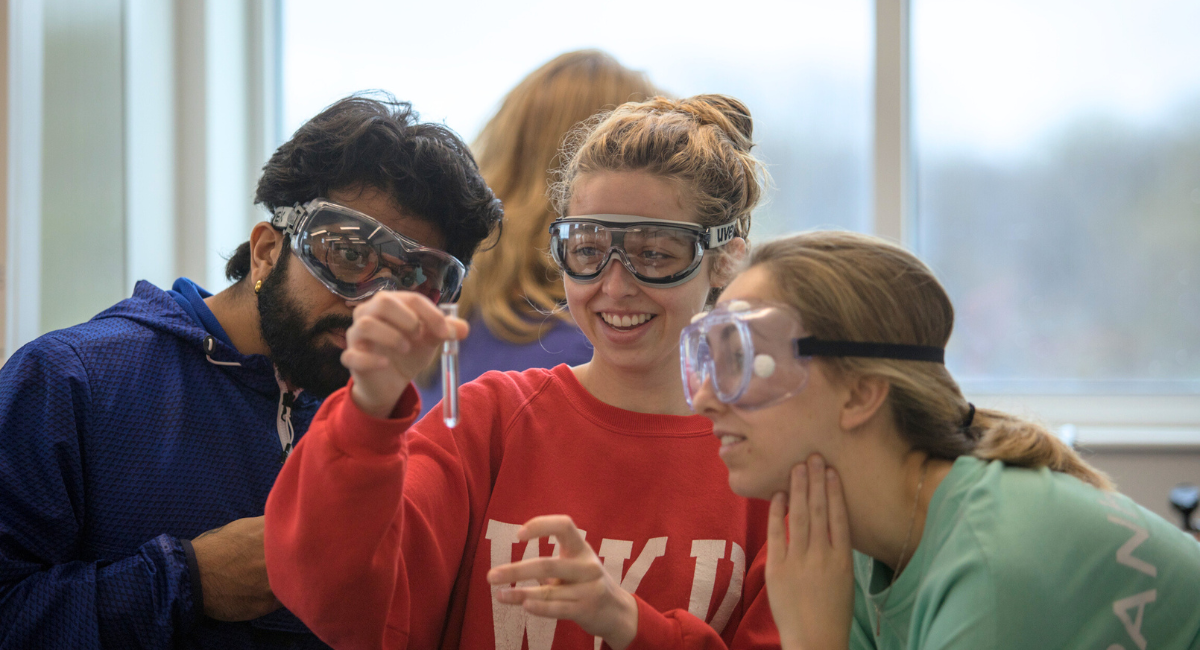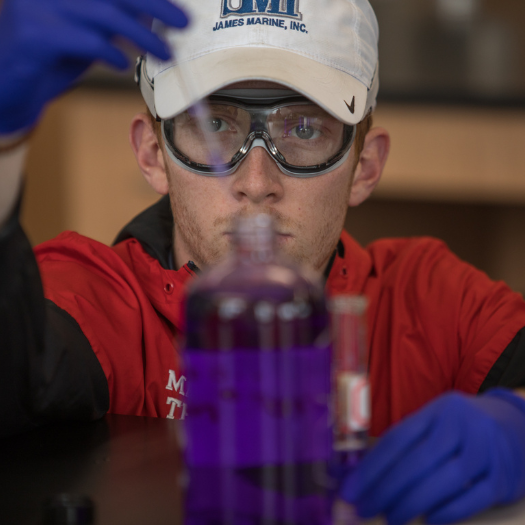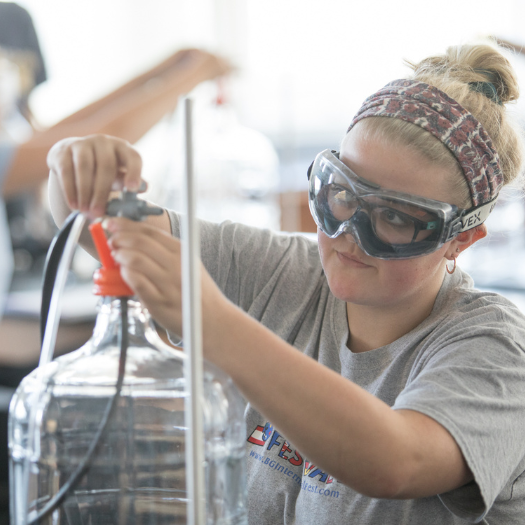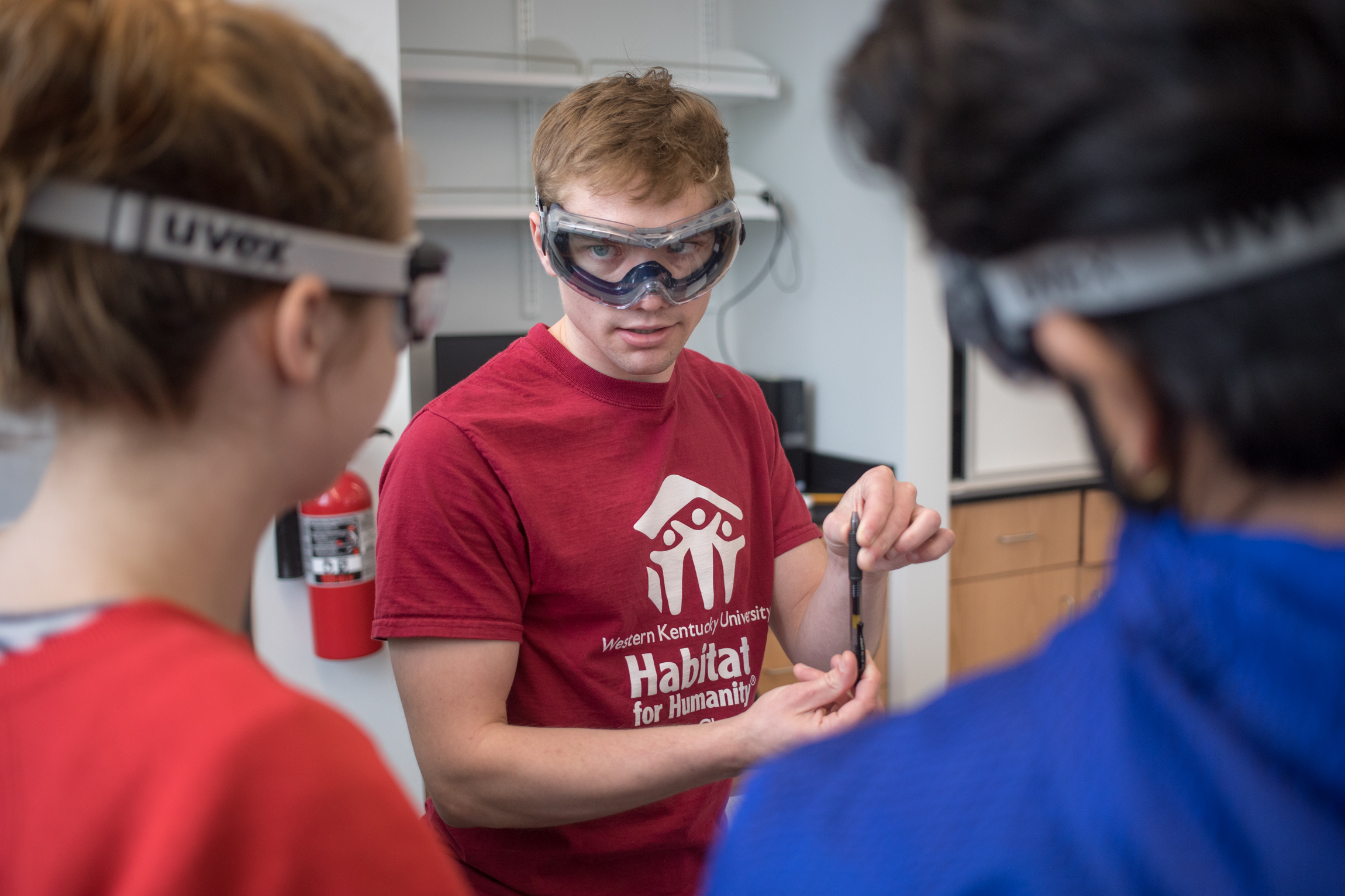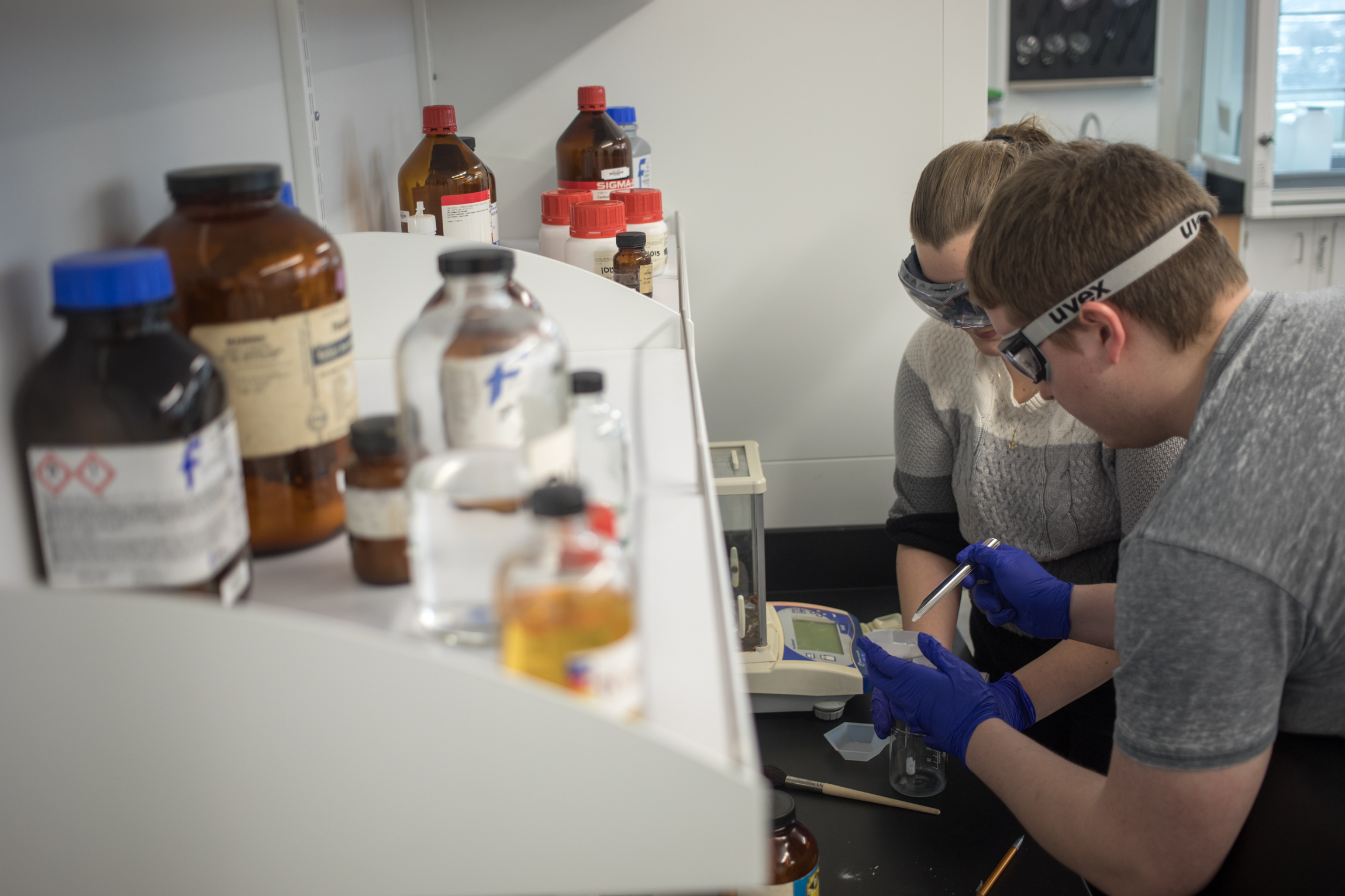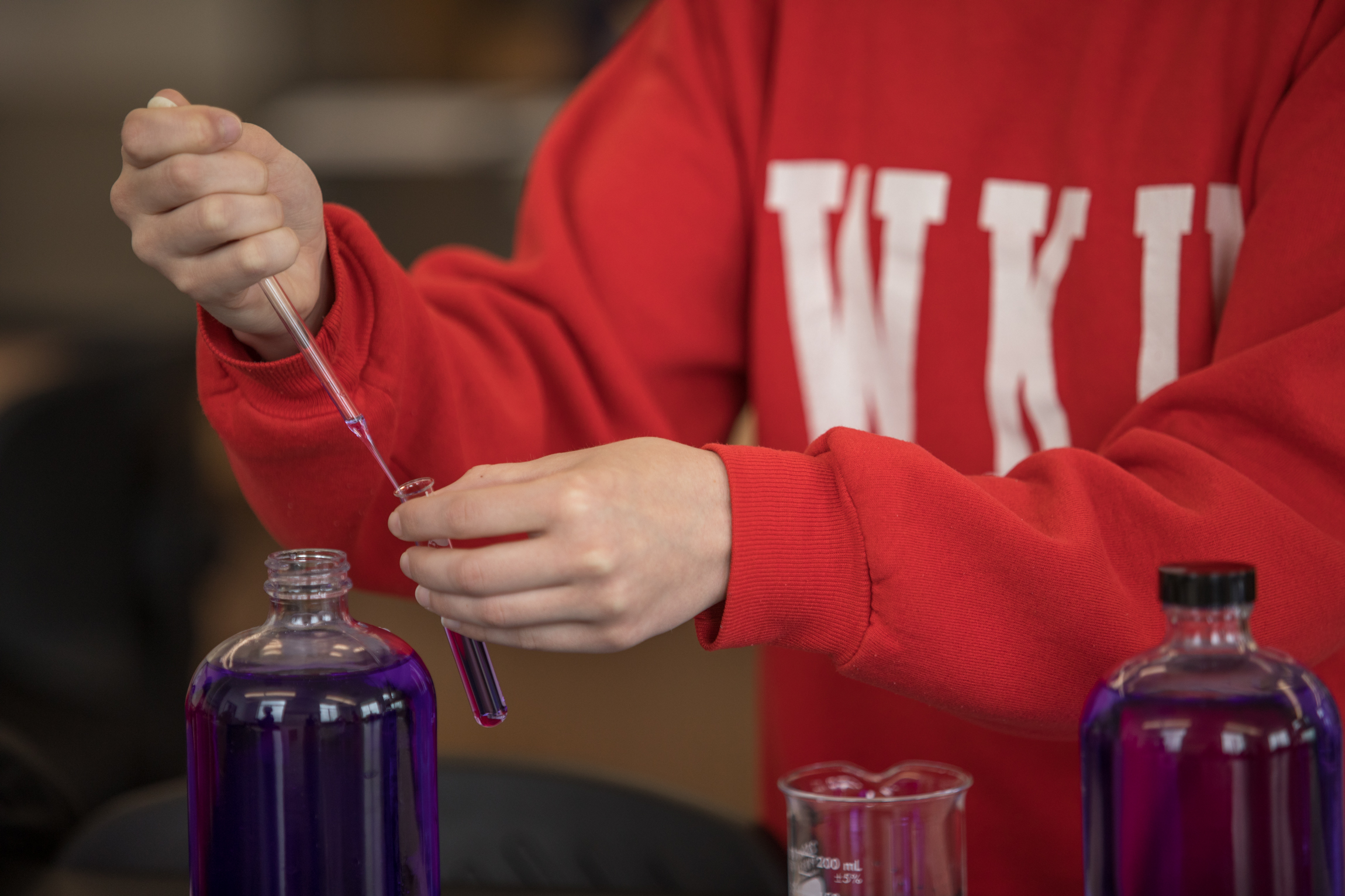Chemistry, Bachelor of Science (623)
- Undergraduate
- Bachelor of Science
- Science and Engineering
- Chemistry
Overview
The major in chemistry requires a minimum of 33 semester hours and leads to the Bachelor of Science degree. Requirements of the major include selecting one of four concentrations: ACS-Approved, Foundations, General, or Teacher Certification. The ACS-Approved Concentration does not require a minor or second major and is typically for students desiring graduate education in chemistry. The Foundations Concentration requires a minor or a second major and is appropriate for a wide range of career targets. The General Concentration requires a second major and is typically chosen by those in pre-health concentrations. The Teacher Certification Concentration is for students desiring Secondary Teacher Certification and requires a second major in Science and Mathematics Education (Reference Number 774). Prior to a selection of a program of study, a student should consult with a chemistry advisor to determine the most appropriate option.
Concentrations
- ACS Approved (CHCR)
- General Chemistry (CHGC)
- Teacher Education (TCHR)
- Pre-Jump Chemistry Advising (PJMP)
- Foundations Chemistry Major (FCHM)
Program Requirements (33-53 hours)
A baccalaureate degree requires a minimum of 120 unduplicated semester hours. More information can be found at www.wku.edu/registrar/degree_certification.php.
Students who began WKU in the Fall 2014 and thereafter should review the Colonnade requirements located at: https://www.wku.edu/colonnade/colonnaderequirements.php.
ACS Approved Concentration (53 hours)
WKU is on the approved list of the Committee on Professional Training of the American Chemical Society. For the Chemistry Department to certify graduates in this concentration, the completion of a minimum of 53 hours of chemistry courses, 16-18 hours of math and science cognate courses, and the Colonnade general education courses for the Bachelor of Science is required. Required chemistry courses for the ACS Approved concentration are:
| Code | Title | Hours |
|---|---|---|
| CHEM 120 & CHEM 121 | College Chemistry I and College Chemistry I Laboratory | 5 |
| CHEM 222 & CHEM 223 | College Chemistry II and College Chemistry II Laboratory | 5 |
| CHEM 320 | Inorganic Chemistry I | 3 |
| CHEM 330 | Quantitative Analysis | 5 |
| CHEM 340 & CHEM 341 | Organic Chemistry I and Organic Chemistry Laboratory I | 5 |
| CHEM 342 & CHEM 343 | Organic Chemistry II and Organic Chemistry II Laboratory | 5 |
| CHEM 398 | Undergraduate Seminar | 1 |
| CHEM 399 | Research Problems in Chemistry | 2 |
| CHEM 420 & CHEM 421 | Inorganic Chemistry II and Inorganic Chemistry Laboratory | 4 |
| CHEM 435 & CHEM 436 | Instrumental Analysis and Instrumental Analysis Laboratory | 5 |
| CHEM 446 | Biochemistry I | 3 |
| CHEM 450 & CHEM 451 | Physical Chemistry I and Physical Chemistry I Laboratory | 5 |
| CHEM 452 & CHEM 453 | Physical Chemistry II and Physical Chemistry II Laboratory | 5 |
| Total Hours | 53 | |
Required Support Courses for ACS Approved Concentration (16-18 hours)¹
| Code | Title | Hours |
|---|---|---|
| MATH 136 | Calculus I | 4 |
| MATH 137 | Calculus II | 4 |
| Select one series from the following: | 8-10 | |
PHYS 231 & PHYS 232 & PHYS 332 & PHYS 233 | Introduction to Physics and Biophysics I and Laboratory for Physics and Biophysics I and Introduction to Physics and Biophysics II and Laboratory for Physics and Biophysics II | |
| or | ||
PHYS 255 & PHYS 256 & PHYS 265 & PHYS 266 | University Physics I and University Physics I Lab and University Physics II and University Physics II Laboratory | |
| Total Hours | 16-18 | |
- 1
Students initially ineligible for MATH 136 should consult their academic advisor for the proper first course in mathematics. It is recommended that students in this program take MATH 237, MATH 307 and MATH 331 in addition to the minimum math requirements listed above. The University Physics track is strongly recommended for this concentration.
Foundations Concentration (37 hours)
| Code | Title | Hours |
|---|---|---|
| Required Courses: | ||
| CHEM 120 & CHEM 121 | College Chemistry I and College Chemistry I Laboratory | 5 |
| CHEM 222 & CHEM 223 | College Chemistry II and College Chemistry II Laboratory | 5 |
| CHEM 320 | Inorganic Chemistry I | 3 |
| CHEM 330 | Quantitative Analysis | 5 |
| CHEM 340 & CHEM 341 | Organic Chemistry I and Organic Chemistry Laboratory I | 5 |
| CHEM 342 & CHEM 343 | Organic Chemistry II and Organic Chemistry II Laboratory | 5 |
| CHEM 398 | Undergraduate Seminar | 1 |
| CHEM 446 | Biochemistry I | 3 |
| CHEM 450 & CHEM 451 | Physical Chemistry I and Physical Chemistry I Laboratory | 5 |
| A minor or second major is required for this concentration | ||
| Total Hours | 37 | |
Required Support Courses for the Foundations Concentration (8-9 hours)
| Code | Title | Hours |
|---|---|---|
| MATH 136 | Calculus I | 4 |
| Select one of the following course sequences: | ||
| PHYS 231 & PHYS 232 | Introduction to Physics and Biophysics I and Laboratory for Physics and Biophysics I | 4-5 |
| or PHYS 255 & PHYS 256 | University Physics I and University Physics I Lab | |
| Total Hours | 8-9 | |
General Chemistry Concentration (33 hours)
The General Chemistry Concentration is recommended for pre-health professions students majoring in chemistry and other students who desire a double major.
| Code | Title | Hours |
|---|---|---|
| CHEM 120 & CHEM 121 | College Chemistry I and College Chemistry I Laboratory | 5 |
| CHEM 222 & CHEM 223 | College Chemistry II and College Chemistry II Laboratory | 5 |
| CHEM 330 | Quantitative Analysis | 5 |
| CHEM 340 & CHEM 341 | Organic Chemistry I and Organic Chemistry Laboratory I | 5 |
| CHEM 342 & CHEM 343 | Organic Chemistry II and Organic Chemistry II Laboratory | 5 |
| CHEM 320 | Inorganic Chemistry I | 3 |
| or CHEM 446 | Biochemistry I | |
| CHEM 450 & CHEM 451 | Physical Chemistry I and Physical Chemistry I Laboratory | 5 |
| A second major is required for this concentration. | ||
| Total Hours | 33 | |
Additional Support Courses for the General Chemistry Concentration (8-9 hours)
| Code | Title | Hours |
|---|---|---|
| MATH 136 | Calculus I | 4 |
| Select one of the following sequences: | ||
| PHYS 231 & PHYS 232 | Introduction to Physics and Biophysics I and Laboratory for Physics and Biophysics I | 4-5 |
| or PHYS 255 & PHYS 256 | University Physics I and University Physics I Lab | |
| Total Hours | 8-9 | |
Chemistry Major with Teacher Certification Concentration (33 hours)
Students interested in teaching chemistry must declare a second major in Science and Mathematics Education (SMED) available through the College of Education and Behavioral Sciences.
| Code | Title | Hours |
|---|---|---|
| Chemistry Major Requirements | ||
| CHEM 120 & CHEM 121 | College Chemistry I and College Chemistry I Laboratory | 5 |
| CHEM 222 & CHEM 223 | College Chemistry II and College Chemistry II Laboratory | 5 |
| CHEM 320 | Inorganic Chemistry I | 3 |
| CHEM 330 | Quantitative Analysis | 5 |
| CHEM 340 & CHEM 341 | Organic Chemistry I and Organic Chemistry Laboratory I | 5 |
| CHEM 446 & CHEM 447 | Biochemistry I and Biochemistry Laboratory | 5 |
| CHEM 450 & CHEM 451 | Physical Chemistry I and Physical Chemistry I Laboratory | 5 |
| Total Hours | 33 | |
Required Support Courses for Teacher Education (16 hours)
| Code | Title | Hours |
|---|---|---|
| MATH 136 | Calculus I | 4 |
| PHYS 231 & PHYS 232 | Introduction to Physics and Biophysics I and Laboratory for Physics and Biophysics I | 4 |
| PHYS 332 & PHYS 233 | Introduction to Physics and Biophysics II and Laboratory for Physics and Biophysics II | 4 |
| GEOL 111 & GEOL 113 | The Earth and The Earth Laboratory | 4 |
| Total Hours | 16 | |
SMED Major Requirements (34 hours)
| Code | Title | Hours |
|---|---|---|
| SMED 101 | Step 1: Introduction to Inquiry-Based Approaches to Teaching | 3 |
| SMED 102 | Step 2: Introduction to Inquiry-Based Lesson Design | 3 |
| SMED 310 | Knowing and Learning in Mathematics and Science | 3 |
| SMED 320 | Classroom Interactions | 3 |
| SMED 340 | Perspectives on Mathematics and Science | 3 |
| SMED 360 | Research Methods for Math and Science Teachers | 3 |
| SMED 470 | Project-Based Instruction | 3 |
| SMED 489 | SMED Student Teaching Seminar | 3 |
| SEC 490 | Student Teaching | 10 |
| Total Hours | 34 | |
The Department of Chemistry offers a Joint Undergraduate Master's Program (JUMP) which provides academically outstanding students the opportunity to complete both an undergraduate and graduate degree in an accelerated timeframe. See https://catalog.wku.edu/graduate/enrollment/ or contact the chemistry graduate program coordinator for additional information.
This JUMP program allows students to start working toward their MS in chemistry while completing their bachelor’s of science degree in chemistry. Undergraduate students admitted into JUMP may take graduate courses that count toward both undergraduate and graduate degrees. Up to 9 credit hours can be double-counted toward both degrees, and up to 12 hours of graduate courses can be taken while a student is completing the undergraduate degree. The key benefit of the JUMP program is that it allows students to earn a bachelor’s and a master’s degree in an accelerated timeframe. For more information, see https://www.wku.edu/chemistry/.
A student must be a chemistry or biochemistry major, and they must have completed at least one semester long research experience with a faculty member in the Department of Chemistry to be considered for admission to the chemistry JUMP program. Note that admissions are competitive and dependent upon graduate program capacity.
Finish in Four Plans
ACS Approved Concentration
| First Year | |||
|---|---|---|---|
| Fall | Hours | Spring | Hours |
| CHEM 120 & CHEM 121 | 5 | CHEM 222 & CHEM 223 | 5 |
| MATH 136 | 4 | MATH 137 | 4 |
| ENG 100 | 3 | COMM 145 | 3 |
| Colonnade - Social & Behavioral Sciences | 3 | ENG 200 | 3 |
| 15 | 15 | ||
| Second Year | |||
| Fall | Hours | Spring | Hours |
| CHEM 330 | 5 | CHEM 340 & CHEM 341 | 5 |
| PHYS 255 & PHYS 256 | 5 | PHYS 265 & PHYS 266 | 5 |
| CHEM 320 | 3 | MATH 237 | 4 |
| ENG 300 | 3 | ||
| 16 | 14 | ||
| Third Year | |||
| Fall | Hours | Spring | Hours |
| CHEM 342 & CHEM 343 | 5 | CHEM 399 | 1 |
| CHEM 398 | 1 | CHEM 446 | 3 |
| CHEM 399 | 1 | CHEM 452 & CHEM 453 | 5 |
| CHEM 450 & CHEM 451 | 5 | Colonnade - Arts & Humanities | 3 |
| HIST 101 or HIST 102 | 3 | Colonnade - Social & Cultural | 3 |
| 15 | 15 | ||
| Fourth Year | |||
| Fall | Hours | Spring | Hours |
| CHEM 399 | 1 | CHEM 399 | 1 |
| CHEM 435 & CHEM 436 | 5 | CHEM 420 & CHEM 421 | 4 |
| Colonnade - Local to Global | 3 | Colonnade - Systems | 3 |
| General Elective | 3 | General Elective | 3 |
| General Elective | 3 | General Elective | 4 |
| 15 | 15 | ||
| Total Hours 120 | |||
General Concentration
| First Year | |||
|---|---|---|---|
| Fall | Hours | Spring | Hours |
| CHEM 120 & CHEM 121 | 5 | CHEM 222 & CHEM 223 | 5 |
| MATH 136 | 4 | COMM 145 | 3 |
| ENG 100 | 3 | Elective or Course in 2nd Major | 3 |
| Elective or Course in 2nd Major | 3 | ENG 200 | 3 |
| 15 | 14 | ||
| Second Year | |||
| Fall | Hours | Spring | Hours |
| CHEM 340 & CHEM 341 | 5 | CHEM 342 & CHEM 343 | 5 |
| PHYS 231 & PHYS 232 | 4 | PHYS 332 & PHYS 233 | 4 |
| ENG 300 | 3 | HIST 101 or HIST 102 | 3 |
| Elective or Course in 2nd Major | 3 | Elective or Course in 2nd Major | 3 |
| 15 | 15 | ||
| Third Year | |||
| Fall | Hours | Spring | Hours |
| CHEM 446 or CHEM 320 | 3 | CHEM 330 | 5 |
| Elective or Course in 2nd Major | 3 | Colonnade - Social & Cultural | 3 |
| Colonnade - Arts & Humanities | 3 | Elective or Course in 2nd Major | 3 |
| Colonnade - Social & Behavioral Sciences | 3 | Elective or Course in 2nd Major | 3 |
| Colonnade - Natural & Physical Sciences w/ no lab | 3 | ||
| 15 | 14 | ||
| Fourth Year | |||
| Fall | Hours | Spring | Hours |
| CHEM 450 & CHEM 451 | 5 | Colonnade - Systems | 3 |
| Colonnade - Local to Global | 3 | Elective or Course in 2nd Major | 3 |
| Elective or Course in 2nd Major | 3 | Elective or Course in 2nd Major | 3 |
| Elective or Course in 2nd Major | 3 | Elective or Course in 2nd Major | 3 |
| Elective or Course in 2nd Major | 3 | Elective or Course in 2nd Major | 3 |
| 17 | 15 | ||
| Total Hours 120 | |||
Foundations Concentration
| First Year | |||
|---|---|---|---|
| Fall | Hours | Spring | Hours |
| CHEM 120 & CHEM 121 | 5 | CHEM 222 & CHEM 223 | 5 |
| MATH 136 | 4 | MATH 137 | 4 |
| ENG 100 | 3 | COMM 145 | 3 |
| Elective or Course in Minor | 3 | ENG 200 | 3 |
| 15 | 15 | ||
| Second Year | |||
| Fall | Hours | Spring | Hours |
| CHEM 330 | 5 | CHEM 340 & CHEM 341 | 5 |
| PHYS 255 & PHYS 256 | 5 | PHYS 265 & PHYS 266 | 5 |
| CHEM 320 | 3 | HIST 101 or HIST 102 | 3 |
| ENG 300 | 3 | Elective or Course in Minor | 3 |
| 16 | 16 | ||
| Third Year | |||
| Fall | Hours | Spring | Hours |
| CHEM 342 & CHEM 343 | 5 | CHEM 399 | 3 |
| CHEM 398 | 1 | CHEM 446 | 3 |
| Colonnade - Arts & Humanities | 3 | Colonnade - Social & Cultural | 3 |
| Colonnade - Social & Behavioral Sciences | 3 | Elective or Course in Minor | 3 |
| Colonnade - Natural & Physical Sciences w/ no lab | 3 | Elective or Course in Minor | 3 |
| 15 | 15 | ||
| Fourth Year | |||
| Fall | Hours | Spring | Hours |
| CHEM 450 & CHEM 451 | 5 | Colonnade - Systems | 3 |
| Colonnade - Local to Global | 3 | Elective or Course in Minor | 3 |
| Elective or Course in Minor | 3 | Elective or Course in Minor | 3 |
| Elective or Course in Minor | 3 | Elective or Course in Minor | 3 |
| Elective or Course in Minor | 3 | ||
| 14 | 15 | ||
| Total Hours 121 | |||
Teacher Certification Concentration
| First Year | |||
|---|---|---|---|
| Fall | Hours | Spring | Hours |
| CHEM 120 & CHEM 121 | 5 | CHEM 222 & CHEM 223 | 5 |
| MATH 117 | 3 | MATH 136 | 4 |
| SMED 101 | 3 | SMED 102 | 3 |
| ENG 100 | 3 | COMM 145 | 3 |
| HIST 101 or HIST 102 | 3 | ENG 200 | 3 |
| 17 | 18 | ||
| Second Year | |||
| Fall | Hours | Spring | Hours |
| CHEM 330 | 5 | CHEM 340 & CHEM 341 | 5 |
| PHYS 231 & PHYS 232 | 4 | PHYS 332 & PHYS 233 | 4 |
| SMED 310 | 3 | SMED 340 | 3 |
| SMED 320 | 3 | ENG 300 | 3 |
| 15 | 15 | ||
| Third Year | |||
| Fall | Hours | Spring | Hours |
| CHEM 320 | 3 | SMED 360 | 3 |
| GEOL 111 & GEOL 113 | 4 | CHEM 450 & CHEM 451 | 5 |
| SPED 330 | 3 | LTCY 421 | 3 |
| Colonnade - Arts & Humanities | 3 | Colonnade - Local to Global | 3 |
| Colonnade - Social & Cultural | 3 | ||
| 16 | 14 | ||
| Fourth Year | |||
| Fall | Hours | Spring | Hours |
| CHEM 446 & CHEM 447 | 5 | SEC 490 | 10 |
| SMED 470 | 3 | SMED 489 | 3 |
| Colonnade - Systems | 3 | ||
| General Elective | 1 | ||
| 12 | 13 | ||
| Total Hours 120 | |||


